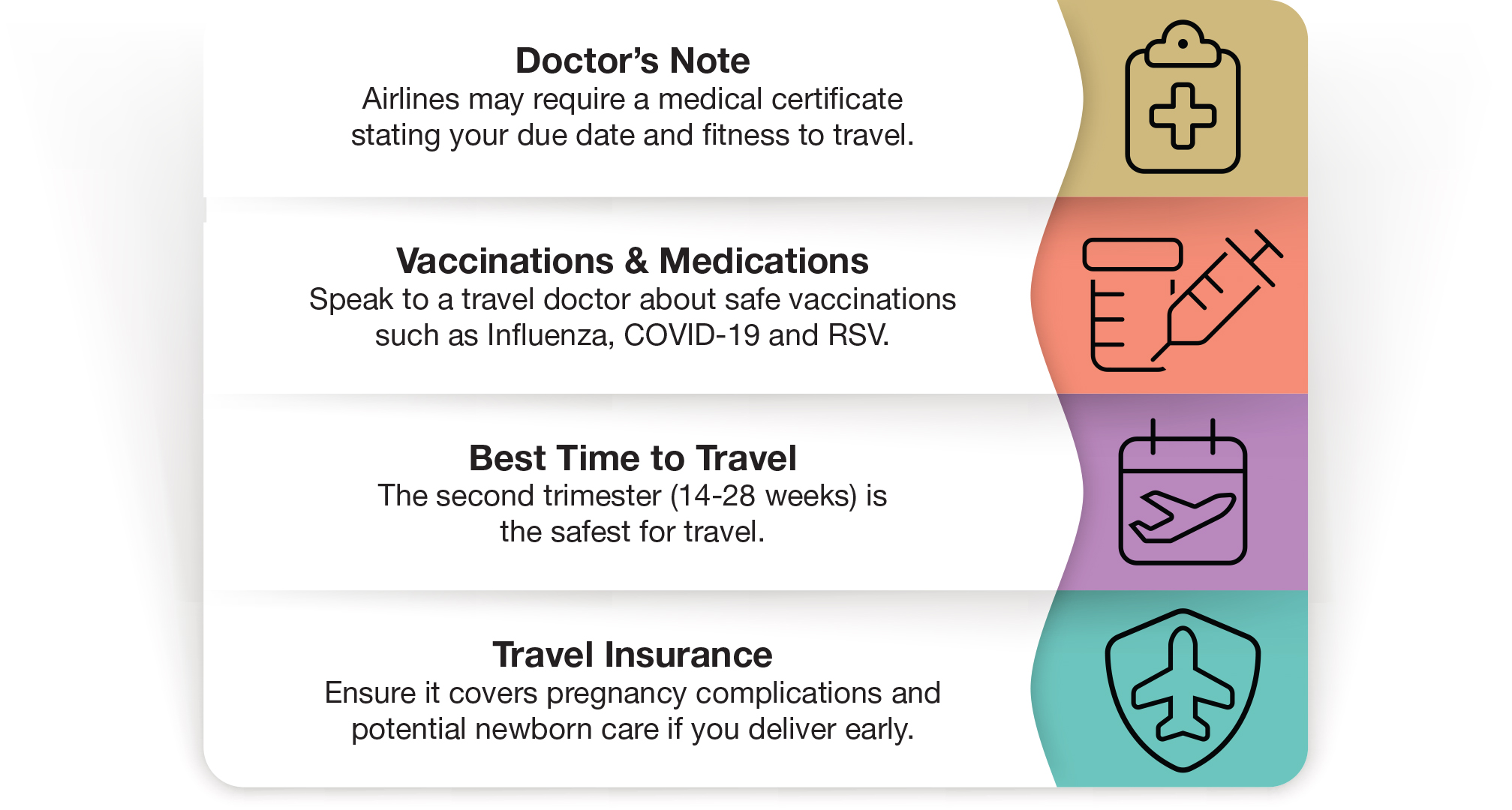Traveling While Pregnant: What You Need to Know
Planning a trip while pregnant? Learn what to consider before you go, including airline policies, vaccination guidance and travel safety tips from your health care provider.
Summer is a popular time for vacations, but if you're pregnant and planning a trip, there are some important things to consider to help keep you and your baby safe. From vaccines to airline policies, this checklist from CU Medicine Maternal and Fetal Medicine provider Terry Harper, MD can help you prepare.

1. Doctor’s note
Some airlines require documentation confirming your due date and that you're medically fit to travel. This is especially important if you’re in your third trimester.
2. Vaccinations and medications
Before traveling, talk with your health care provider or a travel medicine specialist. Vaccines for influenza, COVID-19 and RSV are often recommended during pregnancy and are considered safe. Make sure any medications you plan to bring are also approved for use during pregnancy.
3. Best time to travel
The second trimester, between 14 and 28 weeks, is generally the safest time to travel. Most early pregnancy symptoms have eased and your energy levels may be higher. You're also less likely to go into labor during this period.
4. Travel insurance
Not all health insurance covers pregnancy complications or newborn care while abroad. Look for a policy that includes pregnancy-related issues and neonatal care, especially if you're traveling internationally.
Safety Tips for Pregnant Travelers
To reduce your risk of developing blood clots in your legs or lungs, make sure to:
- Stay well hydrated
- Move around frequently during long trips
- Wear graduated compression stockings
In some cases, your doctor may recommend taking low-dose aspirin around the time of travel to help lower the risk of clotting. Always consult your provider before starting any medication.
You may also wonder about airport security scanners. These machines emit very low levels of radiation, and most experts agree the risk to pregnant people is extremely low.
Avoid travel to areas where obstetric or neonatal care may not meet your needs. Even with insurance, coverage for complications outside the U.S. can be limited. Supplemental travel health insurance is highly recommended.
Airline Travel Policies for Pregnant Passengers
Each airline has different rules about flying while pregnant. Here are a few examples:
- United Airlines: A medical certificate may be required after 36 weeks. One source recommends obtaining it within 72 hours of departure.
- KLM: Advises against flying after 36 weeks for single pregnancies and after 32 weeks for multiples. May require medical clearance before travel.
- JetBlue: Requires documentation for flights within four weeks of your due date, completed within 48 hours of departure.
- British Airways: Requires a doctor’s note and pregnancy record after 28 weeks. Does not allow flying after 36 weeks with a single baby.
- Southwest Airlines: No specific restrictions but pregnant passengers cannot sit in exit rows.
- Frontier Airlines: No stated restrictions. However, by flying, pregnant passengers accept potential risks.
When flying, it's a good idea to carry a note from your doctor confirming your due date and medical fitness to travel, even if the airline does not require it. Find a CU Medicine Obstetrics and Gynecology provider by visiting the specialty page here.
Additional Resources
If your travel plans include international destinations that require vaccines, consult the Centers for Disease Control and Prevention’s Yellow Book. This is a trusted resource for travel-related health guidance.
 Dr. Terry Harper believes in empowering women and families to take an active role in their care. She values building strong relationships with the families she serves to ensur that medical recommendations align with their individual goals. She considers caring for women during pregnancy a profound privilege and is committed to supporting both physical and mental wellness throughout the journey.
Dr. Terry Harper believes in empowering women and families to take an active role in their care. She values building strong relationships with the families she serves to ensur that medical recommendations align with their individual goals. She considers caring for women during pregnancy a profound privilege and is committed to supporting both physical and mental wellness throughout the journey.

